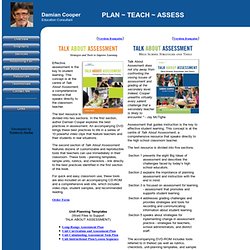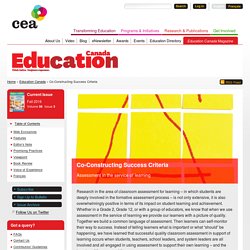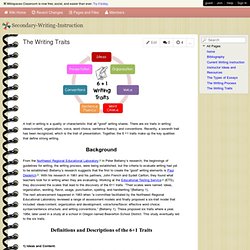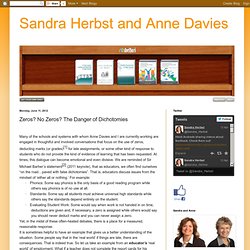

Damian Cooper - Talk About Assessment. Effective assessment is the key to student learning.

This concept is at the centre of Talk About Assesment, a comprehensive resource that speaks directly to the classroom teacher. The text resource is divided into two sections. In the first section, author Damian Cooper explores the best practices in assessment. An accompanying DVD brings these best practices to life in a series of 10 powerful video clips that feature teachers and their students in real situations. The second section of Talk About Assessment features dozens of customizable and reproducible tools that teachers can use immediately in their classroom. For quick and easy classroom use, these tools are also included on an accompanying CD-ROM and a comprehensive web site, which includes video clips, student samples, and recommended reading. Unit Planning Templates(Word Files to SupportTALK ABOUT ASSESSMENT) A Walk in New Delhi with Damian Cooper. Does the Drive to Quantify Learning Get in the Way?
Damian Cooper - Videos. Assessment and Grading for Student Achievement. Our Mission in the 21st Century. Grading Student Achievement. Differentiatedinstructioncontinuum. What Counts? - Co-Constructing Criteria. Co-constructing Success Criteria Successfully - Co-constructing+Success+Criteria+Successfully.pdf. Co-Constructing Success Criteria. Research in the area of assessment for learning – formative assessment plus the deep involvement of students in the assessment process – is not only broad and deep, it is also overwhelmingly positive in terms of its impact on student learning and achievement.

School_Year_Plan.pdf. What Does Fluency Mean? 21st Century Fluencies. Rethinking Rubrics. Secondary-Writing-Instruction - The Writing Traits. A trait in writing is a quality or characteristic that all "good" writing shares.

There are six traits in writing: ideas/content, organization, voice, word choice, sentence fluency, and conventions. Recently, a seventh trait has been recognized, which is the trait of presentation. Together, the 6 +1 traits make up the key qualities that define strong writing.Background From the Northwest Regional Educational Laboratory in Peter Bellamy’s research, the beginnings of guidelines for writing, the writing process, were being established, but the criteria to evaluate writing had yet to be established. Bellamy’s research suggests that the first to create the “good” writing elements is Paul Diederich. Zeros? No Zeros? The Danger of Dichotomies. Many of the schools and systems with whom Anne Davies and I are currently working are engaged in thoughtful and involved conversations that focus on the use of zeros, deducting marks (or grades) for late assignments, or some other kind of response to students who do not provide the kind of evidence of learning that has been requested.

At times, this dialogue can become emotional and even divisive. We are reminded of Sir Michael Barber’s statement (2011 keynote), that as educators, we often find ourselves “on the road…paved with false dichotomies”. That is, educators discuss issues from the mindset of ‘either all or nothing.’ For example: · Phonics: Some say phonics is the only basis of a good reading program while others say phonics is of no use at all. · Standards: Some say all students must achieve universal high standards while others say the standards depend entirely on the student.
Assessment and Evaluation in Online Courses. Ken Robinson: How schools kill creativity. Sir Ken Robinson: Bring on the learning revolution! Adora Svitak: What adults can learn from kids. Diana Laufenberg: How to learn? From mistakes. I Will Not Let An Exam Result Decide My Fate. Why I Hate School But Love Education.